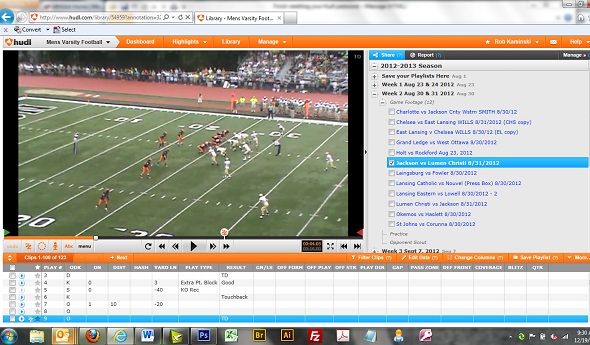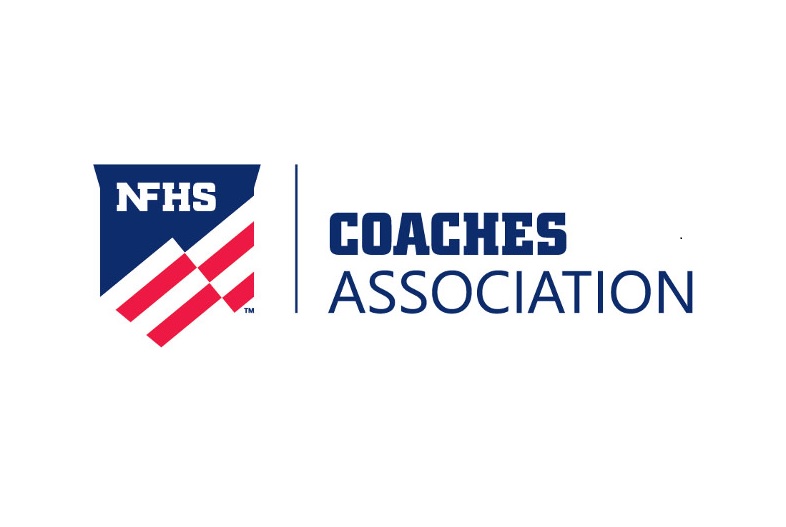
The Changing Face(book?) of Coaching
March 26, 2013
By Rob Kaminski
MHSAA benchmarks editor
From online video exchange programs such as hudl.com to social media platforms like Facebook, Twitter, and LinkedIn, the face of coaching and communicating with teams is ever-changing. How much is too much, and how are the new tools being used by the old guard?
With increasing frequency, today’s coaches are turning to technology to assist in their endeavors, particularly in video review and data compilation, as the number of programs available to them seems to grow on a daily basis.
Among the recent leaders, hudl.com seems to have won the favor of football coaches across the state, reducing video exchange and study to a couple clicks of the mouse.
Several members of the MHSAA Student Advisory Council report that their football coaches use the web-based program, and even local officials associations are using it for film study.
Similar programs are making it easier for today’s coaches to analyze data and compile statistics as well.
“The dispensing of information is much quicker than it used to be,” said Marshall bowling coach Sue Hutchings. “We use a scoring software for our stats.”
In more “visual” sports such as competitive cheer, online video is now essential.
“Video playback and feedback to athletes has helped the sport 10-fold,” said Middleville Thornapple-Kellogg coach Abby Kanitz.
In some cases, coaches are taking the lead on such initiatives.
“I run the MISCA (Michigan Interscholastic Swim Coaches Association) website and receive plenty of positive feedback about us posting meet results and top times reports,” said Bloomfield Hills Andover coach David Zulkiewski. “I also visit MHSAA.com weekly. Since I run the MISCA website, I want to make sure I have accurate and up-to-date information posted.”
Technology has also made the world a bit “greener” even in the small corner that is interscholastic athletics. From the required MHSAA rules meetings moving to an online format, to volumes of data now stored on flash drives rather than in file cabinets, coaches are realizing savings in both time and cost.
“The current state of track and field and cross country is so much more manageable than when I began,” said East Kentwood’s Dave Emeott. “I remember compiling actual papers from all over the state to keep track of the opposition, and now thanks to Athletic.net we have this access at the tip of our fingers. These programs have also replaced nights spent inputting data and record-keeping. I am sure I have replaced all that time elsewhere, but it is probably spent with kids and not with data.”
With the saturation and availability of these reports around the clock also comes temptation for those who are driven, and even obsessed, with such numbers. Coaches can rank near the top of that list.
“Technology can be extremely helpful and time-saving for coaches and teachers,” said Grand Haven wrestling coach James Richardson. “But, the disadvantage is the coaches and athletes have a more difficult time getting away from the sport, as we have access to so much information, and others have more access to us. This can lead to too much time being devoted to our sport.”
It also might even take some of the fun out of the actual competition.
“I think the one negative side of technology is the lack of the unknown,” Emeott said. “There was a day when we would enter a meet and not really know how the day would turn out. Now I have most meets scored within 10 points the day before we arrive.”
At times, such advance information also can lead to overconfidence heading into competition.
“Currently the MHSAA Final draw is posted online, and my players often see it and draw their own conclusions before I have a chance to talk to them about it,” said Allegan tennis coach Gary Ellis. “In the past, I was able to present their draw in the light in which I wanted them to see it.”
Another side effect is the indirect push to play beyond high school.
“There is a lot more social promotion and glamourizing of the athletes,” said Mike Van Antwerp, Holt lacrosse coach. “The recruiting pressure has increased tremendously, which is causing kids to commit earlier and go to great lengths to have a chance at being recruited.”
The world has indeed become a smaller, more familiar place. Not only can students and coaches learn pertinent statistics relating to any given opponent, they can also learn personal information about their competition through the deluge of social media vehicles.
It is in this realm where the greatest divide exists between coaches and their athletes when the subject of technology comes up.
Several members of the MHSAA Student Advisory Council indicate that their coaches do not use social media to assist with the daily activities involved with their sport, while others are but only on a limited basis.
It’s not that the coaches don’t know about Facebook, Twitter, LinkedIn, or the other platforms. More likely, they are all too well versed in the abuses of such mediums by young adults not yet ready to understand the lasting ramifications of a random tweet or damaging photo.
“We have specific rules for use of cell phones at practice, games, in the locker room, etc.,” said Diane Laffey, athletic director and coach at Warren Regina. “We also have a form for parents to sign if they want the coach to be able to text their daughter about practice or game cancellations or changes. We stress that the texting only be for necessary things, and the parents are to give permission.”
Safeguarding against the misuse of handheld devices is becoming as commonplace as handing out uniforms prior to the season.
“By rule, our players aren’t allowed to bring electronic devices to the court with them. We restrict cell phone usage at practice,” said Portage Central tennis coach Peter Militzer. “Players must ‘friend’ the coach on either Facebook or Twitter, and I monitor their activities to make sure their language and behavior meets our standards. We restricted a player’s opportunity to play on varsity last season due to excessive use of crude language and an offensive user name on Twitter.”
PHOTO: This is a screenshot from Hudl.com, an online service used by high school football coaches for video analysis and archiving.

Kent City's Evers Selected for NFHS National 'Coach of the Year' Honor
By
Geoff Kimmerly
MHSAA.com senior editor
January 11, 2023
Kent City cross country coach Jill Evers has been named the 2021-22 National Coach of the Year for girls cross country by the National Federation of State High School Associations (NFHS) Coaches Association.
Evers was selected by a committee including representatives from all eight NFHS sections – Michigan is part of Section 4 with Illinois, Indiana, Iowa and Wisconsin.
The following brief bio includes an excerpt from Evers’ coaching philosophy, which nominees were asked to submit after being identified as candidates for the awards.
 Jill Evers joined the Kent City athletic staff as an assistant cross country coach in 1991 after previously coaching a season each at Allegan High School and Allegan Middle School. She took over Kent City’s girls and boys varsity cross country programs in 1993 and also has served as head girls track & field coach since 1993. She led Kent City’s girls cross country team to a Lower Peninsula Division 3 Final runner-up finish in 2021, the program’s second runner-up finish under her leadership, and she’s also guided Kent City’s girls program to 15 league and seven Regional titles and nine total top-eight Finals finishes. She previously was named an NFHS Section Coach of the Year for girls track & field in 2006 after leading Kent City’s girls track & field team to its first MHSAA Finals championship in that sport, and inducted into the Michigan Interscholastic Track Coaches Association Hall of Fame in 2012. Evers also is a longtime science teacher at Kent City and advisor and mentor for a variety of school activities in addition to coaching.
Jill Evers joined the Kent City athletic staff as an assistant cross country coach in 1991 after previously coaching a season each at Allegan High School and Allegan Middle School. She took over Kent City’s girls and boys varsity cross country programs in 1993 and also has served as head girls track & field coach since 1993. She led Kent City’s girls cross country team to a Lower Peninsula Division 3 Final runner-up finish in 2021, the program’s second runner-up finish under her leadership, and she’s also guided Kent City’s girls program to 15 league and seven Regional titles and nine total top-eight Finals finishes. She previously was named an NFHS Section Coach of the Year for girls track & field in 2006 after leading Kent City’s girls track & field team to its first MHSAA Finals championship in that sport, and inducted into the Michigan Interscholastic Track Coaches Association Hall of Fame in 2012. Evers also is a longtime science teacher at Kent City and advisor and mentor for a variety of school activities in addition to coaching.
“I know people say, ‘Athletics is an extension of the classroom,’ but I believe it's so much more than that. While participating in sports, young people can learn about themselves and others, challenge themselves and grow physically, mentally, emotionally, and socially. Athletics is where we learn life lessons, such as how to lose with grace, cheer for teammates and even opponents, win with humility, deal with adversity, empathize with others, respect all those involved, be grateful for healthy bodies and opportunities to compete and push ourselves beyond what was originally thought possible. Success is different for each person, but I believe cross country lends itself to individual success. Everyone can improve and learn lifelong healthy habits. Everyone can set and achieve goals. Those who aren't as fast often earn the respect of the more gifted runners because of their perseverance. It is my job as a coach to encourage, motivate, and challenge all students who want to participate, and then congratulate them for a job well done.”
Three more Michigan coaches earned honors in Section 4. Mark Posey was honored in boys golf after leading Big Rapids to a 10th-place finish in Lower Peninsula Division 3 in 2022 after four straight Finals runner-up finishes. (There was no LP boys golf season in 2020 due to COVID-19.) Lake Orion boys lacrosse coach Ronald Hebert was honored after guiding his team to the Division 1 Quarterfinals last spring after taking the Dragons to the Semifinals in 2021. Scott Werner was honored in girls track & field after leading Pewamo-Westphalia to a runner-up finish at the Lower Peninsula Division 3 Finals. P-W shared the LPD3 Finals championship in 2021 and has won titles four of the last nine seasons (not counting 2020).
The NFHS has been recognizing coaches through an awards program since 1982.

